Recent Graduates and their Projects
James Petko, MA Graduate, May 2025
Rather than write a traditional thesis paper, I opted to do the experiential track offered by the Anthropology department. This allowed me to spend my two years in the program getting hands-on internship experience in the museum field. I first worked at the Filson Historical Society as their Commonwealth Center Intern in the spring of 2024. This internship involved a wide variety of tasks each day, including the scanning and digitization of books and documents in the Filson’s collection, transferring written and printed information about accessioned items to a central database, and assisting members of the public with reference questions. However, the bulk of my work consisted of creating a finding aid for a collection the Filson had acquired in the 1940s and that had not been much used. This collection was the notes, writings, and collected documents and information of Joseph W. Norwood, of which he used to write his book, The Tammany Legend (Tammanend). This task involved in-depth research of the contained artifacts, a thorough reorganization of the documents by topic, naming of folders and items in accordance with the standards set by the Library of Congress, and writing descriptions for the public to read and understand what is contained in the collection. My other large project was to create a research guide to be made available on the Filson’s website. The focus of this guide was on various health-related topics, with the purpose of helping the public more easily research these topics and find Filson’s resources.
My second internship was at UofL’s Center for Archaeology and Cultural Heritage (CACHe). This work focused on one main project: the revitalization of archaeological collections from four sites excavated around Louisville in 1977. My job was to rehouse artifacts from old cigar boxes into new bags and label tags with all collection and artifact information. This process was to improve the preservation of these artifacts, as well as reduce the collections space footprint for storage saving purposes. As of late April 2025, I have removed about 350 cigar boxes and 8 cubic feet of storage boxes by condensing the contents into smaller, more efficient, and curation-worthy plastic bags.
These experiences have been of great value to me and my future, as I intend to keep working in museums and archives on collections management and curation, for the purpose of preserving and respecting the past, as well as educating the public, both of which are of great importance to me.

James at CACHe with supervisor
Haley Zoeller, MA graduate, December 2023
During the summer and fall of 2023, I collaborated with the Cardinal Cupboard to assess campus food insecurity at the University of Louisville. The Cardinal Cupboard is the student led campus food pantry that strives to provide holistic services to the Cardinal Community. The experiential path allowed me build community and meet a variety of individuals across the state of Kentucky that share similar passions. Over the summer I was able to attend the first annual Food Summit in Louisville, KY. At the summit I was introduced to great minds who are working on food policy, purchasing vacant lots, sustainable farming practices and bringing solutions to food insecurity back to their community. I also had the incredible opportunity to speak at the Food Apartheid Panel on campus food insecurity, hosted by the college of Arts and Sciences.

Haley giving a presentation about her experiential work at the U of L organized "Food Apartheid"
seminar, Oct. 9, 2023
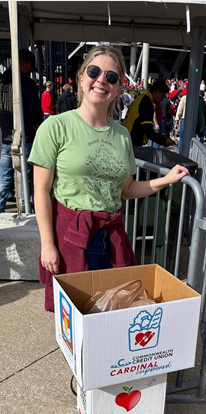
Overall, I developed a white paper on campus food insecurity at UofL that I hope encourages more student, faculty, and staff to get involved with the Cardinal Cupboard. I also intend to share the paper with University leadership, the Council of Post-Secondary Education, and fellow food justice advocates across the state. With the support of the wonderful anthropology faculty, I’ve been able to find my passion for food studies and advocacy work.
Isabel Abarca, MA Graduate, May 2023
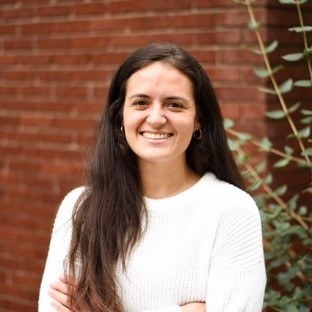
As a Latina who was born and raised in Louisville, KY, I have always been interested in how other Latinx individuals experience this geographic area and other predominately white spaces. My thesis explores how Latinx students navigate higher education in the Upper South, at the University of Louisville, and sheds light on diverse and overlapping experiences. Through qualitative methods, I interviewed fifteen Latinx students, both current and recent alum, to learn more about their identity, college experiences, and career aspirations. The project, titled Identity and Cultural Expression Among Latinx Students in Higher Education, was completed in Spring 2023 and highlights institutional barriers and structural inequities that effect this student population on various levels. My hope is that this research can inform and influence policy changes at UofL that could better support and serve Latinxs students in the future.
The wonderful anthropology faculty at UofL has been instrumental to my success in this program and in completing my thesis. I have gained valuable skills and experiences through coursework and research that will facilitate success in my future endeavors. With the completion of my MA degree, I start a PhD program in Anthropology at UNC Chapel Hill in Fall 2023.
Rebecca Coffield, MA Graduate, May 2023
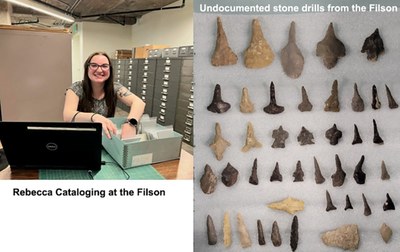
Throughout the summer and fall of 2022, I worked as an archaeological collections assistant at the Filson Historical Society and the Center for Archaeology and Cultural Heritage (CACHe). During my time at the Filson Historical Society, I inventoried, cataloged, and rehoused a collection of Indigenous artifacts donated in 1981 by the estate of Edward Rutledge Lilly, an amateur archaeologist who collected stone tools and associated objects in Jefferson and neighboring counties in Kentucky, as well as parts of southern Indiana. Lilly created both a ledger and a map of when and where these items were collected, giving me the opportunity to create robust cataloging data. I created custom boxes as part of the rehousing of items, giving each individual object its own space, which is better suited for long-term storage. After completing the Lilly collection, I sorted through and organized 1,852 undocumented stone tools as part of a large rehousing project and repatriation effort by the Filson.
My work at CACHe consisted of two parts: rehousing a legacy collection from Lawrence County, Kentucky and creating an environmental report of the storage conditions inside of CACHe. My report looked at how exterior environmental conditions affected the temperature and relative humidity levels inside of the stacks, where most of CACHe’s archaeological collections are held. My analysis showed areas of concern mostly during the winter months when the relative humidity levels dropped well below storage recommendations. Overall, the report showed that daily outdoor low (the temperature outside of the building) was the best indicator of temperature and relative humidity fluctuations inside of CACHe.
Elijah Gardner, MA Graduate, May 2023
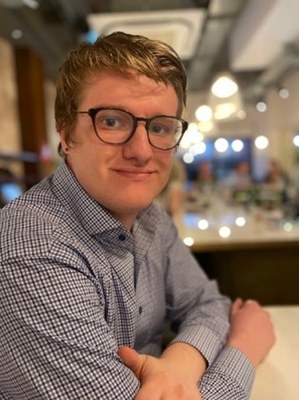
My thesis work used experimental immunology to better define the oral microbiome composition of those suffering from chronic periodontal disease (gum disease). We intend for the findings from my thesis to be used to develop new methodologies for the study of periodontal disease markers in deceased human individuals, with the intent of gaining an improved understanding of the disease's mechanisms and impact on the human skeleton. I did much of this work in the laboratory, isolating human immune cells and cultivating and maintaining cell lines. Through this work, we were able to determine the impact of specific oral pathogens on inflammation and bone loss. This project offered me a unique opportunity to draw from my interests in human biology and archaeology and develop new skills in the laboratory and as a writer. I was privileged to be able to present my research at the 2022 Paleopathology Association meeting in Denver and the 2023 American Association of Biological Anthropologists meeting in Reno, which gave me the opportunity to connect with experts in my field and receive valuable feedback on my work. I am extremely grateful for the experiences I had as a graduate student in anthropology at UofL.
Justin Miller, MA Graduate, May 2023
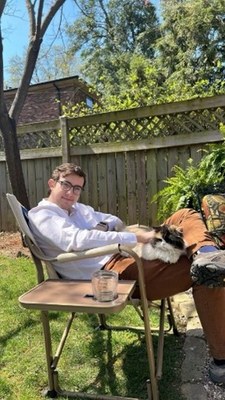
For my internship, I worked with Americana World Community Center. They are a Louisville based organization that provides a wide array of activities, programs, and services for underserved and immigrant populations. During my time at Americana I worked primarily with the after-school youth program; assisting with teaching youth and providing resources to families. Within the youth program I completed a multitude of projects focused on helping students; I took into account factors such as, culture, race, socio-economic status, and home and school life when assisting the youth. This allowed me to apply my anthropological background to support and learn more about the immigrant experience and community in Louisville. My time at Americana also allowed me to break out of my shell, and make everlasting friends and experiences.
Emma Sams, MA Graduate, May 2023
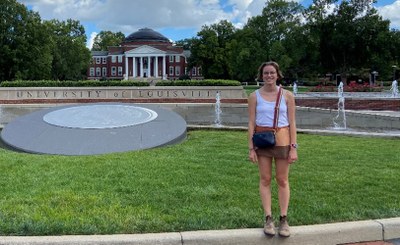
I graduated with my bachelors in 2017 from Transylvania University with a major in anthropology and a minor in Spanish. With a focus on cultural anthropology, my interests span far and wide. I came into the anthropology program at UofL set on completing a thesis, but ultimately decided that following the internship route would best suite me, my interests, and my future endeavors. While the Louisville area offers many internship opportunities, Kentucky Refugee Ministries offered everything that I was looking for in an internship. I spent the spring of 2023 interning for the citizenship program at Kentucky Refugee Ministries and helped immigrants and refugees in the Louisville community study, prepare, and pass their citizenship test and all while helping them grasp a better sense of belonging within the Louisville community. Twice a week I attended citizenship class and worked alongside the teacher to help prepare the students for their citizenship test. Classes consisted of a reading and writing exercise, a history lesson, grammar review, interview preparation, and additional citizenship help. While a majority of the students in class were from Cuba and Mexico, we also had students from Burma, the Democratic Republic of Congo, Afghanistan, and Rwanda. ESL levels in the class varied widely from student to student, and I often spent most of class working one-on-one with the students whose ESL levels were lower than others. Along with one-on-one student help, I also helped lead reading and writing exercises, did lesson reviews, and helped with the week's history lesson.
A part of my internship also included doing administrative work for the citizenship program at the KRM office, such as enrolling students in class, organizing enrollment forms, creating schedules and rosters, reaching out to students via email and text, mailing workbooks, as well as attending, and taking notes during bi-weekly citizenship meetings. At the start of my internship the program director mentioned that he had always wanted to produce a newsletter for the citizenship program to help form better strands of communication between the citizenship program, its interns and volunteers, students, other KRM staff and employees, and the Louisville community. I instantly jumped on board at this idea and spent the entirety of my internship working on getting a newsletter up and running for the program. I did not have any prior newsletter making experience, so I found this process to be harder than I anticipated. The first newsletter I produced was for the month of April and included everything from KRM news and upcoming events, USCIS related news, holidays happening that month, tips, and tricks for the citizenship test, and even a list of students who had recently passed their own citizenship test.
While I came into the program set on doing a thesis, I am very grateful for how things worked out, and could not be more satisfied with my internship work. Not only did I form relationships with the people I worked with and the KRM community, but I formed amazing friendships with every immigrant and refugee who attended class, whether they came to every class every week or simply only came once. I learned a tremendous amount about not only the citizenship process and what it takes to become a U.S. citizen, but I gained a better understanding of the whirlwind of thoughts, feelings, and emotions that immigrants and refugees go through throughout the citizenship experience.
Benjamin Harlan, MA graduate, December 2022
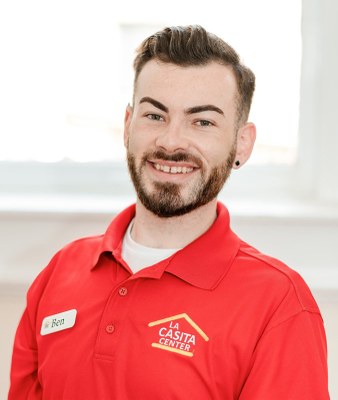
Project overview
Ben is interested in ways people can organize to administer goods and services while also combatting the worst impacts of systemic injustice and building community. He conducted his thesis research with La Casita Center, a Louisville based, immigrant-led nonprofit that accompanies Latinx newcomers. Ben strives to be a community engaged scholar, meaning he is able to express academic interest while also advocating for the community he works with. In his time with La Casita, he conducted semi-structured interviews and participant observation while simultaneously volunteering his time at community events including vaccine clinics and mobile consulates. He completed his thesis: La Casita Center: An Accompaniment Based Approach to Social Justice and Social Service in Fall 2022, and he hopes to use parts of his 108-page thesis to share La Casita's work with more audiences to increase visibility and funding to La Casita.
Ben says his experience with the incredible anthropology faculty at UofL allowed him to hone his academic research and writing skills while also pursuing his career and advocacy goals, stating: "Thanks to the wide array and depth of expertise of faculty members, I've not only learned more about the discipline, but I've also been able to make invaluable connections to community members in Louisville. I've been exposed to scholarship and opportunities at UofL that I otherwise wouldn't have had." After completing his MA, Ben will continue to work with La Casita Center as a research specialist and consultant.
Ben invites you to watch this documentary, which sheds light on the important work the La Casita Center does.
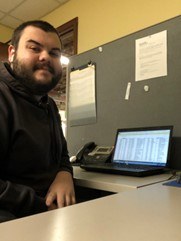
Dane Thomas Pike, MA graduate, December 2022
Project overview
I worked with the Supply Overseas (SOS) International in Louisville, KY as an intern during the Fall of 2022, and had an incredible experience of seeing firsthand the ins and outs of non-profit work. SOS International is an accredited MSRO, or medical surplus recovery organization, which is focused on the collection and redistribution of medical supplies and equipment that would otherwise be thrown away. Through donations from individuals and organizations, such as hospitals and doctors offices, SOS International has been able to send millions of pounds of potentially life-saving medical supplies and equipment to places both locally and internationally.
During my time at SOS International, I worked on various projects, including an analysis of their local health program data to create a list that required outreach, researching foundations and generating a list of prospective funders, updating the prices in the inventory management system, researching various global health organizations (USGLC, USAID, WHO, etc.), and assisting with their audit process. For my special project, I wrote a research paper about the relationship between local and global health, and how the work of MSROs impact global health. This paper was written so that SOS International could use it as a teaching tool and a reference in order to help convey the importance of global health. I learned a lot during my time as an intern for SOS International, such as remaining open-minded, flexible, and professional in the non-profit world. Being at SOS International was an opportunity that I am certain has prepared me for a future career and was an enriching experience that I will look back fondly on.
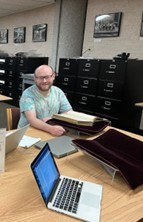
Dustin Smith, MA graduate, December 2022
Project overview
For my Master’s fulfilment project, I decided to take the experiential route. For me, this made sense as it was a better fit for my hands- on learning style. Initially my interest was primarily centered on field-based archeology, but during my coursework at UofL, I found myself growing more interested in museums. I suppose this isn't a surprise as museums house artifacts! Zrventually, I found myself being the collections intern at the Conrad-Caldwell House Museum. My experience there was academically enriching and rewarding. I had the opportunity to do research on the servants who lived/worked on the property. We utilized various resources, including genealogy websites, descendant interviews, and city directories. We started the project knowing about 11 servants, but ended up with 53! We were lucky enough to have a photo sent to us from a descendant (with hopefully more on the way). The original idea was to create an exhibit which features information about the servants, as well as more information about being a servant. Although the exhibit had to be put on hold, I did have the opportunity to create an exhibit plan, which will be useful in the future.
I also had the opportunity to gain a better understanding of how a small, non-profit museum works. It truly was all hands-on deck, which was something that I actually enjoyed as I was able to experience a variety of things, including, learning how to use the museum’s cataloging system, grant writing, and fundraising, which are skills that will be helpful in future endeavors. To me, the most rewarding part about my internship was helping to make the servants visible, as they had been forgotten by time. I have to credit my training in anthropology for helping me understand how important this project was and how important visibility was for this project. This project has truly been one of the best experiences of my life.
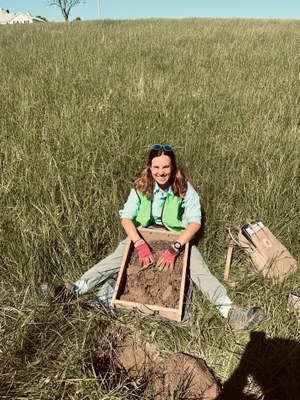
Ashley Lawhorn
For my summer 2021 internship I worked as an archaeological field technician in the Cultural Resource Management sector. CRM works to prevent the destruction of culturally significant historic and prehistoric sites across the U.S. This type of archaeology is unique and invaluable to the lives of so many—CRM archaeologists act as the first line of defense when protecting culturally significant places of the past from modern developments. Throughout the course of my internship, I worked on four different phase I projects across the Southeastern United States. These surveys consisted of surface walking and shovel testing. The projects varied in size and could take anywhere from one week to several months. Throughout my experience I was able to enhance my ability to identify artifacts and soil-color changes. Additionally, this opportunity allowed me to become more familiar with ArcGIS Collector: a mapping technology that records GPS data when conducting field survey. My internship allowed me to enhance my skillset and experience this unique sector of archaeology. Having completed this experience, I’m confident that CRM would be both an exciting and rewarding career option.
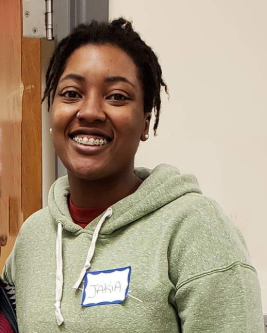
Jakia Marie
Immigrant and Refugee Programming at the Iroquois Library, Louisville
As the African Immigrant and Refugee Programming Intern at the Iroquois Library, I was able to put what I learned through my Anthropology courses into practice. I was able to assist the library with their weekly programming such as English Conversation Club (ECC) and weekday tutoring and other community events. I assisted in organizing events, leading reflective discussions during events, connecting our community members with other community organizations, and community outreach. I worked directly with immigrant and refugees from around the world, and I worked more closely with those from the African continent. I had the opportunity to work with a diverse population, and my passion for African Diasporic experiences in the U.S. grew.
The Anthropology M.A. program has challenged me to be more critical and analytical in the way in which I understand migration and immigration policies. Refugee Mobilities taught me more about the realities of the refugee experience. The material from this course helped me in understanding those I worked with at the Iroquois Library. Our Globalization Seminar taught me more about the world in general and how global economies and policies impact us all in various ways. This course helped me better understand how groups of people from around the world are marginalized and disenfranchised at the hands of the global elite. What I learned from this course was influential in how I related to the diverse population at the library because I had this knowledge of the complexities of globalization and global migration. Without my background in Anthropology, I would not have been as equipped to work with such a diverse population in a meaningful way. My Anthropology coursework helped me better appreciate the work that is being done at the Iroquois Library and the sacrifices those we have worked with have made.
Working with the Iroquois Library has challenged me to reflect on how I can work harder to make a more equitable community in Louisville and more equitable global society. This internship has helped me become more critical in my thinking as it relates to scholarship concerning African immigrants and refugees in the U.S. I have also reflected on how I can become a better global citizen. In all, this experiences has shaped my scholarship and outlook on life in a positive way.
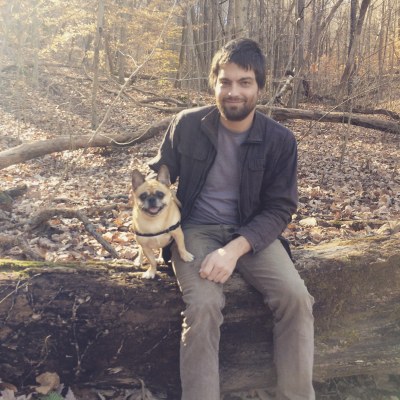
Allan Day
In 2016 I received a Bachelor’s degree in English from IU-Southeast. I decided to take the writing skills I had developed and explore the social sciences. My interest in the machinations of culture led me to the University of Louisville Anthropology department, where I focused my Master’s work on issues of sustainability and the environment. I wanted to understand how various cultures conceive of the human relationship to the environment, why so many societies function unsustainably, and what impact sustainability efforts might have upon socio-cultural systems.
During my time here, I became involved in two pertinent research projects. The first was to explore cooperative grocery stores from a social sciences perspective to contribute to efforts to start such an operation in Louisville. The second was a follow-up on a project from a political ecology class exploring students’ changing conceptions of nature and the environment.
I was interested, too, in taking active part in sustainability work beyond the academics. I had previously performed some volunteer work through the WWOOF program, connecting volunteers to organic farms. My university studies in sustainability led me to the Citizen Forester program at Louisville Grows, a nonprofit organization supporting urban agriculture, urban forestry, and environmental education. Citizen Foresters are specially trained to lead teams of volunteers for tree planting events. I concluded my academic career with an internship at Louisville Grows, helping with their various operations and programs.
The internship transitioned into a full-time fund development position at Louisville Grows through the Americorps Vista program. This position ends in June 2019 after which I intend to continue work pertaining to sustainability and environmentalism. The ideal is to take a position conceived by Louisville Grows in conjunction with Limbwalker Tree Service as an urban arborist apprentice. This opportunity largely depends on pending grant applications, so its feasibility remains to be seen. Meanwhile, while the completion of this position is a little ways off, I keep my eyes open for potential future opportunities.
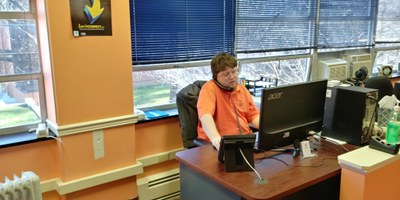
Joseph Knall
My time pursuing a master’s degree in cultural anthropology at U of L has been, despite the hard work, the most enjoyable and the most satisfying part of my life so far. My work for that degree culminated in an internship, and a job, at the Coalition for the Homeless. At the Coalition, I work in a project called Single Point of Entry, helping to secure emergency shelter for homeless individuals and families, directing them to resources made available by various organizations in Louisville, and facilitating collaboration between those organizations by participating in programs such as Operation White Flag, Stand Down, and others. While working at the Coalition, I realized that there was a vast and ever-growing amount of data on homelessness across Kentucky to which I and my coworkers had access. It is important to maintain good data for funding reasons, but the data can be useful to the Coalition itself as well. Though some use is made of it, the sheer amount of data to which the Coalition has access piqued my interest, and I began to consider different ways it could be looked at beyond what I knew was already being done. I became interested in the question of why people use and, in some cases don’t use, resources that are intended for use by homeless people in Louisville. As a small first step in the direction of answering that question, I undertook a project in which I digitized and then analyzed a good deal of data about individuals who were outside on a specific night and those within the three major shelters with which the Coalition is affiliated, on that same night.
From even that snapshot of a single point in time, a number of mysteries arose, and I intend to look both backward and forward at other nights on which data about people staying outside was collected in order to see what patterns emerge over time, both from year to year and at different times of the year. I would like to expand my analysis of the data already collected by the Coalition and other organizations to look at how long people stay in shelters and to what demographic and other factors length of stay seems to correlate, and to analyze data about last zip code prior to becoming homeless in order to map housing insecurity in Louisville over time.
I still work at the Coalition for the Homeless, not as an intern but as a full-time employee. Ultimately, my hope is to participate in, and, if necessary, organize, an in-depth ethnographic study of homelessness in Louisville, particularly as it relates to my initial questions about the use of resources, in hopes that it can be used to inform future efforts in the Coalition’s ongoing struggle to alleviate and ultimately bring an end to homelessness.
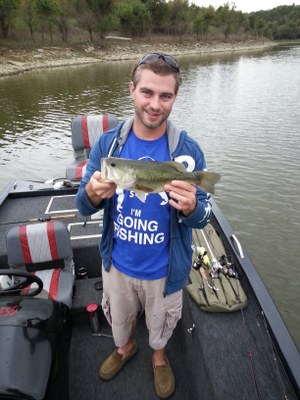
Julian Schagene
Over the summer and fall of 2018, I was an intern of Dr. M. Jay Stottman at the Kentucky Archaeological Survey. The goals of my internship included learning the skills I will need for a career in Cultural Resource Management, networking while working on projects, and familiarizing myself with the state and federal laws that dictate CRM archaeology. During this time, I would participate on a range of projects from public archaeology projects and teaching parents and children about archaeology and history to working on Section 106 Federal projects. The projects ranged in terrain from paved urban neighborhoods to rural and dense forests and surveying steep hiking trails. The projects also covered various time periods from Archaic era shell middens to 20th century homesteads across western, central and eastern Kentucky.
Working on these projects provided me with valuable experience in preparation for a career in Cultural Resource Management by showing me the types of projects that are commonly done, learning about the National Register of Historic Places, and participating in all Phases of excavation. Working at Riverside, The Farnsley-Moremen Landing and the Squire Earick House both public archaeology projects were eye-opening and rewarding by educating the public on the importance of archaeology and history and having them participate in excavations. Surveys in Daniel Boone National Forest were tough at times and provided me with the first experience of my internship. Hiking through remote and steep forest while having to dig shovel probes was rough, but the surveys here not only provided valuable skills that helped me throughout my internship but will help me the rest of my career. In addition to learning skills in the field, I also learned lab skills and how to use artifact databases to store and extract data.
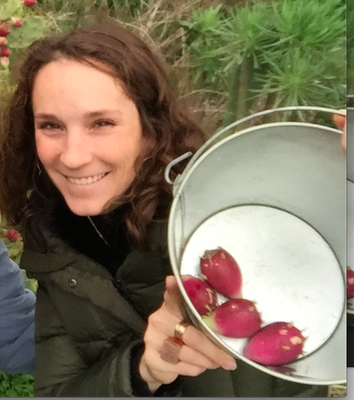
Natalie Srouji
My internship took place at Newcomer Academy. Newcomer Academy is a JCPS institution that serves students in grades 6th-11th, who are participating in their first year of formal instruction in the United States. Our school provides educational resources to individuals who have recently arrived to the United States.
My role was to explore the existing relationships established through volunteer efforts and to restructure the ways in which our school had previously engaged with its volunteer base.
I was able to accomplish this through an application of Anthropology that allowed me to collect data through ethnographic research, or fieldwork. I collected data in the following ways:
Surveys and Open-Ended Questionnaires
- Participant Observation
- Field Note Writing
- Everyday Conversations
- And Semi-Structured Interviews
I spent four months developing a platform for which Newcomer Academy would interact with volunteers, logging more than 300 hours. During this time I was able to accomplish the following:
1. Developed and managed a volunteer program at Newcomer Academy
2. Created a Newcomer Academy volunteer website
3. Coordinated volunteer engagement within the school
4. Managed community outreach and development
5. Collaborated with school admin and staff
Through these experiences and with an application of Anthropology I was better equipped to develop a sustainable network of community support.
Anthropology helped me to think through this process through an application of concepts related to infrastructure. I treated the space as a socially charged network of engaged individuals, with varying ideas and interests. I observed the diverse ideologies taking shape within the school. In doing so, I was able to develop solutions and re-think the existing system in place.
In this process of developing a network of community support I explored concepts of power, and considered the ways in which the staff, volunteers, and myself are often making decisions for the students based upon what we understand as valuable to their success as individuals. Often the decision making process is made in communication with the teachers, rather than the students, requesting that teachers inform us on the ways in which volunteers could support their students rather than directing the question to the student themself. It serves as a reminder that we need to ask students, and young people for that matter, what it is that we can do for them?
This is now where I find myself; exploring the role of education in shaping our youth and the ways in which identifies are formed within the space of those institutions of education. I have the opportunity to stay at Newcomer Academy to address these questions working to fulfill the position of High School English and U.S. History teacher. For the months of January and February I will have the opportunity to make observations through engaging experiences with students at Newcomer Academy. During this time I will also be working on getting my teaching certificate to begin teaching full time in the Fall of 2019.
